A major controversy has erupted over the applicability of the Section 87A rebate in India’s income tax law, particularly concerning taxpayers with capital gains income.
While Budget 2025 increased the rebate limit to ₹12 lakh under the new tax regime, uncertainty remains on whether the rebate extends to Short-Term Capital Gains (STCG) and Long-Term Capital Gains (LTCG).
Section 87A Rebate: Does It Apply to Capital Gains?
Taxpayers under the new regime with total income up to ₹7 lakh can avail of the rebate, reducing their tax liability to zero. However, tax experts highlight ambiguity regarding its applicability to special rate incomes.
“There is an issue with the application of the Section 87A rebate, specifically for taxpayers with both regular income and special rate incomes such as STCG,” said Yeeshu Sehgal, Head of Tax Markets, AKM Global. “While Budget 2025 clarified its exclusion for special rate incomes, confusion persists on whether the rebate should be calculated on total income or only on the regular income portion.”
CBDT’s Position: Rebate Excluded for Capital Gains
The Central Board of Direct Taxes (CBDT) has categorically excluded STCG and LTCG from the rebate calculation while processing returns through the ITR utility portal. This has led to many taxpayers receiving tax notices for incorrect rebate claims.
“CBDT has suo-moto in the ITR Utility portal denied the benefit of rebate under Section 87A on such short-term and long-term capital gains, creating a controversy,” said Gaurav Jain, Partner, Direct Tax, Forvis Mazars.
When Is the Rebate Allowed or Denied?
Allowed:
- Normal income taxed at slab rates
- Long-term capital gains under Section 112 (except equity shares & equity mutual funds)
- STCG under Section 111A (taxed at 15% on listed equity shares & equity mutual funds)
Not Allowed:
- LTCG under Section 112A (on equity shares & equity mutual funds taxed at 10%)
Some CIT(A) rulings have supported taxpayers’ interpretation that the rebate should be available on total income, including capital gains. Until a definitive judicial or legislative resolution, tax experts recommend contesting unjustified rejections.
What Should Taxpayers Do If They Receive a Tax Notice?
- Review the Notice – Verify whether the rebate claim aligns with tax laws.
- Consult a Tax Expert – Seek guidance from a Chartered Accountant (CA) for clarification.
- File a Rectification or Appeal – If wrongly denied, submit a rectification request or contest the notice.
“Taxpayers should respond to notices promptly and ensure proper documentation to support their rebate claim,”advised Sehgal. CA Ruchika Bhagat, MD of Neeraj Bhagat & Co., emphasized, “Understanding income composition is crucial before claiming the rebate.”
As the confusion over Section 87A rebate continues, taxpayers must stay vigilant and proactive. With increasing tax scrutiny and evolving interpretations, staying informed and consulting professionals is essential to avoid penalties and ensure compliance.
- Whether Wrong Address & GSTIN on Invoices Should Deny ITC? Supreme Court Admits Dept’s Appeal - July 15, 2025
- ICAI vs BCI: Which Is Stricter? - July 15, 2025
- Foreigners Subject to Dual Tax Regime Under Singapore’s Income Tax Laws - July 15, 2025






